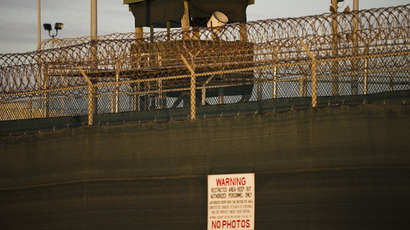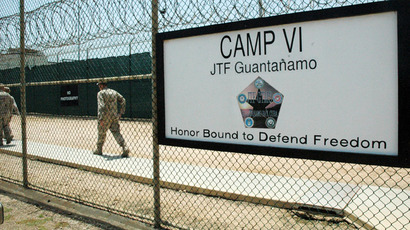US military admits three Gitmo hunger-strikers hospitalized, at least 10 force-fed
Three Guantanamo detainees were hospitalized as a result of the hunger strike, which has entered its 49th day. At least 10 of the strikers are being force-fed, military officials admitted. Human rights advocates said the numbers were being under-reported.
They’ve been hospitalized for dehydration, according to the spokesman for the prison on the US base in Cuba, Captain Robert Durand.
The men who are being force fed liquid nutrients are reportedly shackled to a chair while a feeding tube is inserted into their nose.
“Prisoners are not eating anything, surviving only on water. Any supplies left on cellblocks and with prisoners have now been exhausted,” the newspaper quoted Ramzi Kassem, a lawyer for several Guantánamo prisoners.
The officials say the number of the hunger strike participants is 28. However, the inmates' lawyers have claimed that over 100 prisoners are taking part in the hunger strike; according to the Center for Constitutional Rights, 130 inmates are taking part in the mass protest over their treatment and conditions at the prison. Many of them have reportedly lost a substantial amount of weight.
Inmates' defense lawyers may have no way to reach Cuba's Guantanamo Bay prison after the Navy decided to discontinue commercial flights to the military base, allegedly because of an old regulation that had been 'overlooked.' The order came shortly after the lawyers sent a letter to Defense Secretary Chuck Hagel urging him to take action to end the mass protest at Guantanamo.
Pardiss Kebriaei an attorney for the Center for Constitutional
Rights who represents a Yemeni Gitmo detainee, told RT there were
“serious health repercussions” to the hunger strike, now in
its eighth week, such as “loss of hearing, potential
blindness.”
“There is potential for death as well if the hunger strike
continues for weeks,” the lawyer warned. Her client has
allegedly lost 20lbs (9kg) since the beginning of the strike.
The collective protest was reportedly triggered by the prison
staff’s seizure of inmates' personal belongings. The hunger strike
began on February 6, with the prisoners protesting against the
confiscation of their personal letters, photographs and mail, as
well as the allegedly sacrilegious handling of their Korans during
searches of their cells.
While US officials have downplayed the hunger strike, the case has
drawn severe criticism from the international community. Although
half of Guantanamo detainees have received papers from the US
government clearing them to be transferred out of the prison, they
are still being held at the camp.
“Indefinite detention without charge at Guantanamo and Bagram
and unfair military commission trials are a damaging blight on the
human rights record of the United States. We urge the US government
to bring an end to these illegal practices by either prosecuting
these detainees in civilian courts or releasing them,” the UN
said in a statement.
Amnesty International has called Guantanamo an “American
gulag.”
“Instead of justice for the 9/11 attacks, Guantanamo has brought
us torture, indefinite detention, unfair trials and hunger
strikes,” Amnesty International’s head of the Security with
Human Rights Campaign said.
A few months ago, the US State Department shut down the legal
office working to close the prison. The detention camp in eastern
Cuba reportedly holds 166 men seized in counterterrorism operations,
most of whom have been held without charge for a decade.
Human rights organizations have reported hundreds of suicide
attempts, at least seven of which were successful. Last September,
a Yemeni detainee took his life after spending more than a decade
at Guantanamo. Adnan Latif had been cleared for transfer by both
the Bush and Obama administrations, but was never released.
Although Barack Obama pledged to shut down the facility at the
beginning of his first term as president, the facility remains
open.
Last week, the US Southern Command (SOUTHCOM) requested $49 million
to build a new prison building at Guantanamo Bay to give shelter to
“special detainees,” as well as to carry out other “necessary”
renovations.
The proposed facility was conceived as replacement for Camp 7,
which was constructed to hold 14 “high-value” detainees – including
the self-described 9/11 attack architect Khalid Sheikh Mohammed –
who had been in CIA custody, but were handed over to the military
in 2006.














